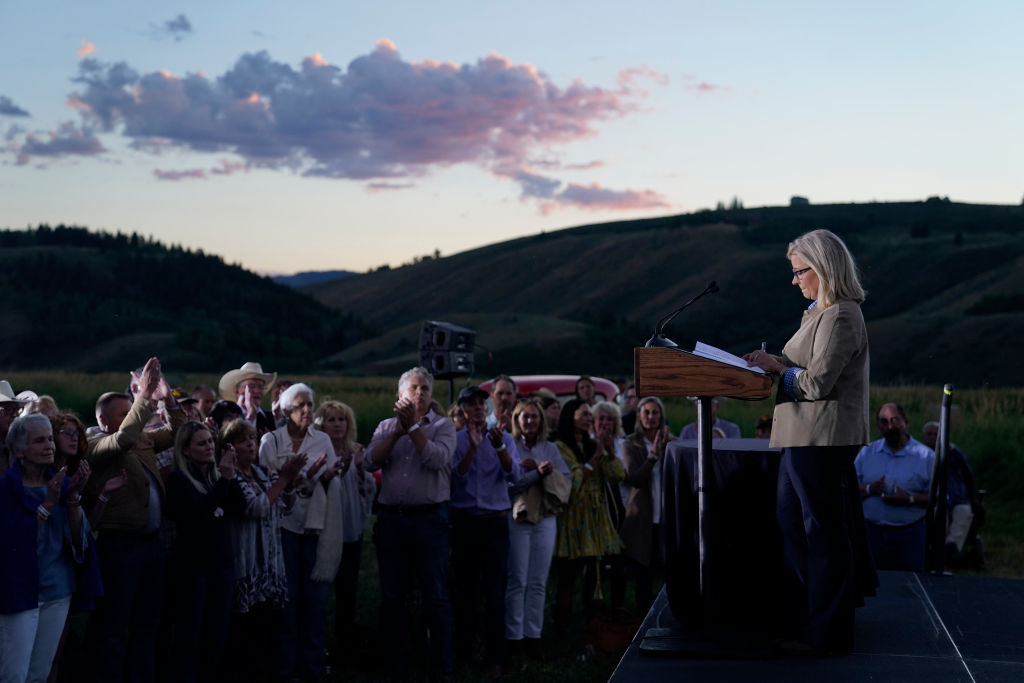The last days of the Liz Cheney campaign.

JACKSON, Wyoming—Almost exactly 24 hours before her congressional career was cut short with a loss in the Republican primary vote here Tuesday evening, Liz Cheney addressed a small gathering of staff and supporters munching on bison burgers and trout tacos in a private room at the Roadhouse Brewing Company on Jackson’s main square.
She began by thanking her top aide and confidant, Kara Ahern, and joked that the plan for election day was whatever Kara said the plan would be. Then she turned to the others in the room. “I can’t thank you guys enough,” Cheney said. “I can’t thank you enough for everything you have done, everything that you have been willing to take. I know you guys, many of you, have been on the tip of the spear for the last year and a half. I know that it has not always been easy, but I’m just so honored and humbled that you guys have all stayed in the fight—and it’s a really important fight—and we could not have done it without the hard work of all of you.”
For many in the room, those words conjured memories of angry calls from constituents, tense relationships with other GOP congressional staffers, even disputes with family members. Some of them defied threats from House Minority Leader Kevin McCarthy’s political operation, which insisted that they stop working for Cheney or see their work for other Republicans abruptly end.
There were no illusions among those gathered for dinner about what was going to happen Tuesday, yet the mood was anything but somber. Cheney joked about some of the hostile calls her team had to handle. She thanked her husband, Phil Perry. And she looked to the future. “No matter what happens tomorrow, we’re in this fight for the long haul,” she insisted. “And we’re in this fight to make sure that those of us who believe in freedom and those of us who believe in the importance of maintaining our Constitution, those of us who believe in the importance of the republic—we’re going to prevail. I look forward to having all of you guys with us in the long term—especially Phil.”
The final days of the campaign didn’t much resemble the mad scramble of years past. No downtown grip-and-grins. No late-night rallies. No phone bank drop-ins.
Instead, the day before the election featured a trip to the DMV, a quick trip to the ranch that would host her election night party, a leisurely backyard conversation. Midday, Cheney took her son to register to vote and cast his first ballot. In line, she was greeted by well-wishers, including several Democrats and independents who registered as Republicans to support her. (One such Democrat didn’t have to take that extra step. “A few years ago, I registered as a Republican to vote against you. Now, I’m voting for you,” he said, shaking his head with a laugh.)
Some of this anti-campaign is explained by electoral reality; some of it, concerns about physical security. All of it is owing to Donald Trump. In his remarks on January 6, 2021, Trump singled out Cheney, who had become one of the most outspoken opponents of his brazen attempt to remain in power despite losing the election. “We got to get rid of the weak congresspeople, the ones that aren’t any good,” Trump said. “The Liz Cheneys of the world. We got to get rid of them.” When Trump later declared defeating Cheney his top electoral priority in 2022, Cheney’s vanishing path to victory included a coalition of Trump-skeptical Republicans, Democrats, and independents. Her problem? There weren’t enough Trump-skeptical Republicans, Democrats and independents in Wyoming.
Cheney understood this from the moment she decided to speak out against Trump’s election lies. Wyoming is the country’s Trumpiest state. He won here in 2020 with nearly 70 percent of the vote, almost tripling Joe Biden’s 26 percent. That’s a greater margin than anywhere else. And the palpable enthusiasm for Trump has been consistent—he won with a greater margin here in 2016—and continued even as Trump fabricated stolen election claims. (State GOP Chairman Frank Eathorne was revealed to be a member of the Oath Keepers, a far-right militia group whose members planned and instigated the violence on January 6. Eathorne was at the Capitol that day.) The choice was stark—do the things she’d have to do to get reelected or continue to speak out against Trump. But her objective—restated in her concession speech Tuesday night—was clear: Keep Donald Trump from the White House.
Cheney’s reasoning was straightforward. Trump and his attempts to steal an election and remain in power—and the willingness of Republicans to support him despite those efforts—present an unacceptable risk to the future of the country. Put simply, they matter more than anything else—more than policy differences with Biden, more than Republicans controlling Congress, more than continuing her rapid climb to national GOP leadership, more even than keeping her seat.
That last point confounded her political operation. How do you run a campaign if the real goal isn’t to win the election? In the days after her vote to impeach the president, Cheney’s team came to her again and again with the kind of advice you’d expect in a conventional race. Fellow congressional Republicans implored her to play down her differences with Trump—or at least vocalize them less frequently—so that she might keep her seat.
Cheney did the opposite. Elected after the 2020 election to the No. 3 position in House Republican leadership, Cheney continued to pound Trump rhetorically. She rejected pleas—then threats—from McCarthy to keep her head down. She survived her first vote of no confidence, but after publicly lambasting Trump at a House GOP retreat, and rejecting counsel even from fellow anti-Trump Republicans to take it down a notch, the Republican conference stripped her of her leadership role. Her work as vice chair of the January 6 committee ensured that her challenges to Trump, and criticism of fellow Republicans enabling him, were amplified. This was no way to win an election.
“There was a path that she could have taken that would have required her changing her message, changing her strategy and deviating from what she thought was essential in this campaign, which was defending democracy and its ideals,” said one senior Cheney adviser. “And she made a very clear and conscious decision and told her staff that she was not going to do that. She wasn’t going to sacrifice what she was fighting for to win an election. And she was very consistent about that through the two-year process—whenever we would have larger strategy discussions about how you would get over the finish line in a state like Wyoming.”
Her impeachment vote and the speech she gave excoriating Trump ensured that finding a path to victory would be difficult. But she chose to make the path more difficult. She didn’t slink through the halls of Congress avoiding reporters or speak vaguely about election irregularities, hoping that Republican base voters would see the wink. She took every opportunity to condemn Trump’s behavior and to condemn those who refuse to condemn it. “Tonight, I say this to my Republican colleagues who are defending the indefensible: There will come a day when Donald Trump is gone, but your dishonor will remain,” she said in her opening remarks at the January 6 committee hearing on June 9, 2022.
And the closing argument of her campaign was an ad featuring her father, former vice president Dick Cheney, who’d once held the seat she was giving up. “In our nation’s 246 year history there has never been an individual who is a greater threat to our Republic than Donald Trump,” the elder Cheney intoned, looking straight into the camera. “He tried to steal the last election using lies and violence after voters rejected him. He is a coward. A real man wouldn’t lie to his supporters.”
As Jonathan Martin of the New York Times memorably put it: “In a state where Mr. Trump won 70 percent of the vote two years ago, Ms. Cheney might as well be asking ranchers to go vegan.”
Last week, National Journal’s “Political Ad Spotlight” featured an analysis of the ad under the headline, “Liz Cheney’s Big Gamble.” But the ad wasn’t a big gamble at all. It was a calculated decision—a choice made more than a year ago with a full understanding of the consequences.
“As a political professional, it’s tough when members disagree with your advice,” said the Cheney adviser. “But she was absolutely correct with the path that she forged—I think was the right one. And it was her conviction that it was the right thing to do. That’s why she did it.”







Please note that we at The Dispatch hold ourselves, our work, and our commenters to a higher standard than other places on the internet. We welcome comments that foster genuine debate or discussion—including comments critical of us or our work—but responses that include ad hominem attacks on fellow Dispatch members or are intended to stoke fear and anger may be moderated.
With your membership, you only have the ability to comment on The Morning Dispatch articles. Consider upgrading to join the conversation everywhere.